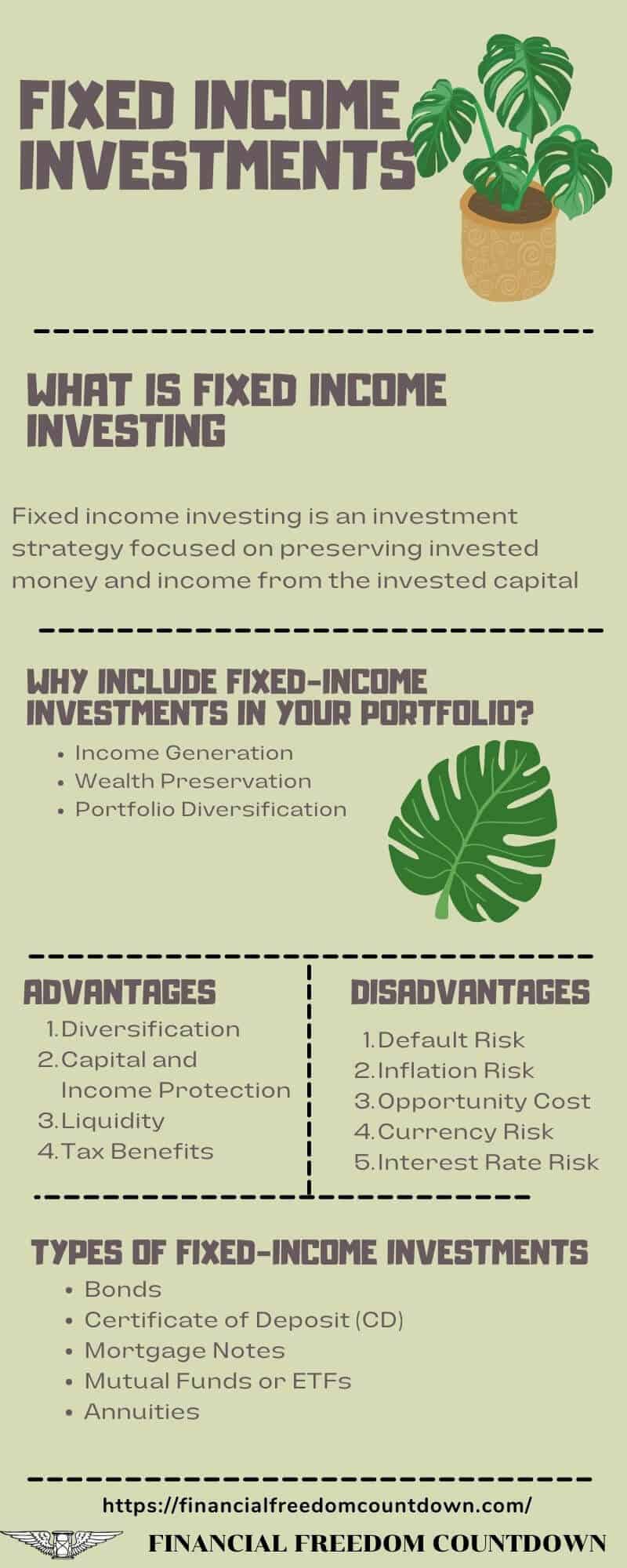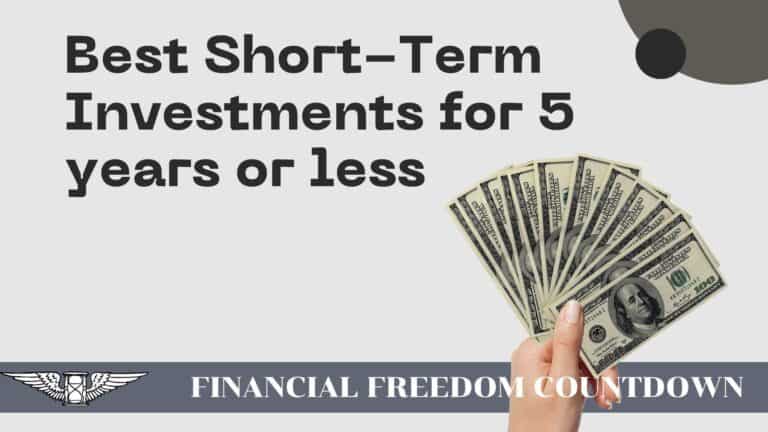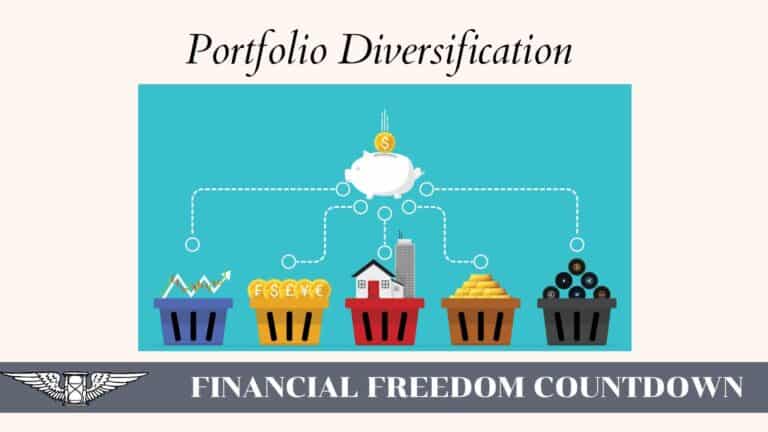Fixed Income Investments: Pros and Cons of Fixed Income Investing and How To Get Started

Are you looking for a safe and reliable investment?
You may have heard that investing in fixed income securities is a conservative way to grow your money, but you’re unsure about the drawbacks.
Learn the various types of fixed income investments, the pros and cons, and how to get started.
What Is Fixed Income Investing?
Fixed income investing is an investment strategy focused on preserving invested money and income from the invested capital. You can reliably expect to get a fixed income in your investment returns or at least be able to rely on your investments reaching a specific minimum value over some time.
Other types of investing – like investing in stocks– maximize growth potential and ensure that your portfolio generates as much profit as possible. Fixed income investing is done to preserve the money you invest. Because risk and return are inversely co-related, fixed interest rate instruments generate smaller income levels.
There are many types of fixed-income investing opportunities that you can purchase to build up your fixed-income portfolio, including government bonds, municipal bonds, corporate bonds, certificates of deposit, and more.
When appropriately used, fixed-income investing can be an excellent addition to your portfolio of asset classes. It can help to reduce risk and provide security. However, there are disadvantages to fixed income investing, as these investment products may not grow at the same rate as other, riskier investments.
Although real estate investment trusts (REITs) or dividend stocks provide income, they are not considered fixed-income investments as the payout can change from one month to the next.
Advantages of Fixed Income Investing
There are several advantages of fixed-income investing and why you may consider adding some fixed-income investing instruments into your portfolio.
Diversification
First, fixed-income investments can be a critical risk reduction strategy in your portfolio as one can use them to diversify investments. They can serve as excellent protection against stock market volatility, as the stock market is almost always more volatile than any fixed-income security.
How much risk you want to accept is a critical question. Still, fixed-income investments are generally less risky than investments in stock or other alternative investments like investing in cryptocurrency or art investments. Because of this reduced risk, you can be virtually guaranteed a minimum return rate on any highly rated fixed-income investments.
Capital and Income Protection
Second, fixed-income investments are great at protecting the invested capital and guaranteeing an income stream. Indeed, generating cash is one of the key reasons these financial tools are used. These financial tools will provide you with regular interest rate payments.
The timing of this payment may alternate – it may come monthly, quarterly, or annually. However, it will come, and this means that you have money that you can either reinvest, pay your federal taxes, or use to handle your living expenses.
However, one needs to observe the fixed income investment ratings. Rating agencies provide ratings for all fixed instruments, from high yield bonds issued by financial institutions to government bonds to junk bonds. Junk bonds can fail and cost you your investment.
However, suppose you invest in a specific type of fixed income product, such as U.S. government bonds or bonds backed by an AAA+ financial institution. In that case, you are likely to have your rate of return virtually guaranteed.
Liquidity
Third, remember that fixed-income investments often allow for flexibility. While interest payments should remain constant and consistent throughout the life of a bond, or at least until that bond reaches its maturity date, one can sell fixed-income security or investment-grade bond on the secondary market. It means that an investor could decide that the price of fixed income security has reached a good point and that one can sell that security for a profit.
Alternatively, someone may need an infusion of cash and thus sell the bond on the secondary market. It would result in a loss of interest payments. However, individual bonds can be sold on the bond market, creating an attractive alternative way for a person to turn a profit on individual bond sales.
The bond market is one of the most liquid markets, and it is not hard to find a seller. U.S. Treasuries are one of the most sought-after instruments during a crisis. Corporate and municipal bonds might not have the same level of liquidity.
Tax Benefits
Finally, there are potential tax benefits of certain types of bonds. For example, treasury bonds do not have to pay state or local taxes. When structured correctly with the right asset location plan, an investment strategy that incorporates fixed-income securities can help you lower your tax liability. A well-planned tax strategy can help you shelter most of your income from taxes.
Disadvantages of Fixed Income Investing
As positive as a fixed income investment can be for you, there are always negatives.
Default Risk
First, there is always a credit risk or risk of default. Credit risk means that it is always possible that the underlying corporate or government may not be able to make interest payments on a bond, resulting in bankruptcy and a total investment loss.
In these scenarios, bondholders are usually paid from any remaining liquidated assets in bankruptcy. However, bond prices will drop as low as possible in this scenario, and there is no guarantee that you or other investors will get your money back.
A U.S. government-issued Treasury bond is one of the safest instruments globally, but it has low returns. Chasing returns with high-yield bonds and other fixed-income investments come at a price. Sovereign nations have defaulted in the past, as have many reputable companies and even local governments.
Inflation Risk
Second, there is always an inflation risk with any fixed-income products. If inflation rises, interest rates on an existing bond may not rise. You can generate interest on your investments, but these investments may be insufficient to keep up with inflation. As such, you’ll lose money on your investments.
With the rise in inflation, rates for I-Bonds have increased, making them a popular income-generating asset. On the other hand, E.E. bonds are not indexed to inflation.
Opportunity Cost
Third, market value in alternative investments, like real estate syndication or the stock market mutual funds, may rise. If you are not invested in other funds, you may lose the opportunity to general revenue on these investments, thus costing you money and ultimately hurting your bottom line.
There is an opportunity cost for any money invested in fixed income instruments, which must be considered when planning asset allocation. A large fixed income allocation would not significantly increase one’s average net worth.
Currency Risk
Investing in international bonds carries an additional risk of devalued currencies. In times of crisis, the U.S. dollar strengthens against foreign currencies. So although your foreign government bond pays the debt obligation, you could lose money when converted into USD.
Non-U.S. companies and governments frequently issue dollar-denominated bonds (bonds denominated in U.S. currency) to appeal to U.S. investors or protect against currency fluctuations.
Interest Rate Risk
When interest rates rise, the value of a bond or other fixed-income investment will drop. The converse is also true when interest rates fall. Longer-term bonds are more price sensitive to rate changes than shorter-term bonds and carry more interest rate risk. The primary cause of price swings in the bond market is interest rate adjustments.
If you hold a bond to maturity, you do not suffer losses. The loss is only in terms of the price someone is willing to pay if you want to sell the bond before maturity.
Bond mutual funds hold a portfolio of different bonds of varying maturity duration and can suffer from higher interest rate risk than individual bonds you own until maturity.

Types of Fixed Income Investments
A range of fixed-income investments can provide you with a steady cash stream.
Bonds
Bonds are essentially loans that companies take from private investors. Depending on how a bond is structured, a company or government will issue a bond. They will then pay that bond back over a set period, paying interest on the bond as they repay. Someone who holds a bond for the entire duration of its period should get their principal back – with interest. There are many types of bonds, including:
Government Bonds
A government bond is the most typical fixed-income security. The most frequent government securities are those issued by the U.S. Treasury and known as Treasury securities. However, non-U.S. governments also issue many different types of fixed-income securities.
- Treasury bills, also known as T-bills, are short-term fixed-income securities issued by the U.S. Treasury that mature in less than a year. T-bills do not pay coupon interest. The bill is purchased at a price less than its face value by investors who anticipate receiving the difference at maturity.
- Treasury bonds, also known as T-bonds, are issued by the U.S. Treasury and have 20 or 30 years of maturity. Treasury bonds pay a fixed interest rate every six months until they mature.
- Treasury Inflation-Protected Securities (TIPS) provide inflation protection as measured by the Consumer Price Index (CPI). TIPS pay interest twice a year at a specified rate. You can buy TIPS from TreasuryDirect or through a bank or broker.
Municipal Bonds
Municipal bonds are a form of government bonds that are usually without risk. Municipal governments will periodically need significant capital for long-term investments like any other massive operation. These investments may include facility purchases, significant pieces of equipment, fleet upgrades, infrastructure, or more. Municipalities will likely use these investments for years or decades, so it only makes sense to pay the cost of these investments over an extended period. A municipality may turn to the bond market to raise the necessary capital. They will repay these bonds over a set period. The bond rating will determine the interest rate on these bonds, with a less risky bond paying back lower interest rates.
Municipal bonds are usually very safe. It is unlikely that a municipal government will ever completely default on its debt. They are relatively safe investments that are highly likely to pay back their loans.
Many jurisdictions have been teetering on the verge of bankruptcy or have defaulted, including Jefferson County, Alabama; Harrisburg, Pennsylvania; and Stockton, California.
Corporate Bonds
Like governments, corporate entities will sometimes need large sums of money to invest in infrastructure, facilities, mergers, acquisitions, etc. Or, if you are MicroStrategy, you could also raise capital with a corporate bond to buy Bitcoin on your balance sheet.
Corporations may borrow the money in the bond market rather than borrowing that money directly from a bank.
Corporate bonds, like municipal bonds, are rated by independent rating agencies, with rating agencies determining the overall risk of a company not paying back their bondholder. Investors should conduct extensive research on any company before investing in their bonds.
A safer bet is always to avoid “junk bond,” status, or anything related, as bonds with this rating are highly likely to default on investments. Bondholders do have some protections in the event of a bankruptcy, but they are usually not enough to allow an investor to recoup their losses completely.
Certificate of Deposit (CD)
A CD is a fixed-income instrument issued by banks or credit unions. CDs have Federal Deposit Insurance Corporation (FDIC) or NCUA insurance and are more secure than corporate bonds. Ensure you check the FDIC limits when buying CDs.
Mortgage Notes
Real estate note investing involves purchasing mortgage notes to make money from periodic interest payments. Mortgage notes are assets backed by real estate, and you might have recourse to foreclose in the event of a default.
The mortgage note contains the terms of how the borrower will repay your loan and how the home will be used as collateral if one fails to pay back the loan. The mortgage also contains the borrowers’ names, property addresses, and legal identification by the parcel number or lot number.
The mortgage is also known as a Deed Of Trust or Security Deed in some states.
When investing in mortgage notes, check the lien position, Loan to Value (LTV), and ensure the note is performing.
Mutual Funds or ETFs
Instead of picking individual bonds to invest in, one can buy a bond mutual fund or a bond ETF.
Bond funds can pursue actively managed bond strategies chasing the most attractive opportunities in fixed income markets based on credit ratings to provide higher returns.
Because mutual funds are highly diverse investment instruments, they hold a portfolio of different bonds of varying maturity duration. They can suffer from higher interest rate risk than individual bonds you own until maturity.
Like everything, there is no such thing as a risk-free bond fund. You may purchase a fund only to have many of its parts lose value, costing you money and your ability to get a dividend payment.
Annuities
Fixed annuities providing guaranteed returns for a set length of time with tax deferral are popular among older people. A fixed-rate annuity is similar to an insurance contract in which you pay the insurance firm several payments for a certain amount of time, known as the “accumulation phase.”
They offer to pay you a specific, guaranteed interest rate on your contributions when the accumulation period ends. Those payments to you may be for any length of time or the rest of your life. The insurance company’s solvency and its ability to continue paying the annuity is a risk one must consider.
Why Include Fixed Income Investments in Your Portfolio?
As you can see, fixed-income investments have a real place in any investment portfolio. There are many reasons you may want to consider adding them to your investment portfolio. These include:
Income Generation
- Fixed income investments can help generate income, thus providing you with critically needed cash flow. It can be vital for individuals who have retired and are looking to live off their investments. Having a stable income stream to fund the fixed expenses part of your retirement budget is the bedrock of your financial independence plan.
- Another passive income stream to augment one’s human capital.
Wealth Preservation
Compared to a “get rich” portfolio, a “stay rich” portfolio would have a larger share of fixed-income investments. Because they are not as risky, fixed-income investments tend to ensure that the total investment balance is preserved. It ensures that someone will keep the vast majority of the principle behind their assets and be able to transfer generational wealth using a revocable living trust.
Portfolio Diversification
Because they can diversify a portfolio, fixed income is helpful, pulling you out of stocks, particularly if you are heavily invested. Generally, when the stock market goes down, bond values tend to increase, thus giving you a chance to increase the value of your portfolio if there is a problem within the stock market.
Furthermore, if the stock market tanks, you will have a chunk of your finances protected, thus ensuring that your portfolio does not lose its entire value.
For most people, a portfolio made up entirely of fixed-income investments will likely be too conservative to match their needs. It also won’t be diverse enough. However, having at least a portion of your portfolio contain fixed-income assets will likely make sense for your needs. You will need to take stock of your individual financial situation and ensure that your portfolio allotment aligns with your overall financial goals.
How To Invest in Fixed Income Securities?
There are several options depending on the type of fixed-income investment in your portfolio.
U.S. Treasury securities can be purchased at TreasuryDirect.gov
CDs can be bought at your local bank or credit union.
Municipal bonds and corporate bonds can also be bought using brokerage accounts.
Bond Funds can be purchased via an investment advisor or brokerage services. BND is one of the most popular Vanguard bond ETFs. You can dollar cost average (DCA) into it using M1Finance. Read my M1Finance review on how to set up DCA. Or you could also buy Bond ETFs at Webull or SoFi.
For mortgage notes, banks are a good source of performing and nonperforming mortgage notes for investors looking to buy. In addition to dedicated note exchanges, many real estate crowdfunding platforms offer debt investing, which is the same as the “clipping coupons” strategy of mortgage note investing.
I have invested in several debt deals with PeerStreet, which has a low $1,000 minimum. When buying notes, I emphasize the LTV ratio as the primary filtering criteria in my checklist to evaluate crowdfunded real estate.
Final Thoughts on Fixed Income Investments
Ultimately, how you choose to invest in fixed-income securities depends on your income objectives. Fixed income investments are one of the safest investments for monthly income.
More conservative investors, or investors interested in preserving their money or generating income to live on, are likely to rely heavier on a fixed-income portfolio. Fixed-income assets can be an excellent part of a diversified portfolio. They can help you guard against risk and ensure that you are generating income by providing periodic interest payments.
You should always understand that no type of investment is truly risk-free. No matter what, investing involves risk. Investment-grade bonds tend to minimize these risks, but as always, past performance is not guaranteeing future success when it comes to any investment. While corporate and municipal bonds, money market funds, and other fixed-income products are typically low risks, you can permanently lose your money. It would help if you kept that in mind as you make your investment decisions.
Remember, whether or not to invest in fixed-income securities is ultimately tied to your overall investment objectives. Suppose you are young, healthy, and working. It may be more worth it to make some riskier investments and try to gain value in your portfolio rather than invest conservatively and only seek interest income. It can ensure that you have a higher base investment to generate interest as you get older.
Furthermore, even if you are heavily invested in fixed-income securities, you will need to keep an eye on the greater financial picture, including how rates will move based on the federal government’s actions. For example, as interest rates rise, bond prices fall, and other investment types become more attractive. As such, changes made in monetary policy by the federal government can have a massive impact on a fixed-income portfolio.
As you can see, a fixed-income product unquestionably has various positive implications for your tax portfolio. The accrued interest can be reinvested in other investments or used for living expenses, making them an ideal investment if you are trying to protect your investment portfolio or generate an income stream that you can live off. They are not for every situation. An overreliance on fixed-income securities may have problematic tax implications and leave you on the wrong side of inflation and stock market growth.
Besides the U.S. Treasury, CDs and standard bond index funds, several fixed-income investments exist. Be cautious about annuities and other products. Seek out investment advice from only a fee-only registered investment adviser acting as a fiduciary. Good financial advisors should be able to provide you with advisory or brokerage services, stock market investment advice, and specific information about individual bonds or the bond market only after considering your financial situation.

John Dealbreuin came from a third world country to the US with only $1,000 not knowing anyone; guided by an immigrant dream. In 12 years, he achieved his retirement number.
He started Financial Freedom Countdown to help everyone think differently about their financial challenges and live their best lives. John resides in the San Francisco Bay Area enjoying nature trails and weight training.
Here are his recommended tools
Personal Capital: This is a free tool John uses to track his net worth on a regular basis and as a retirement planner. It also alerts him wrt hidden fees and has a budget tracker included.
Platforms like Yieldstreet provide investment options in art, legal, real estate, structured notes, venture capital, etc. They also have fixed-income portfolios spread across multiple asset classes with a single investment with low minimums of $10,000.





